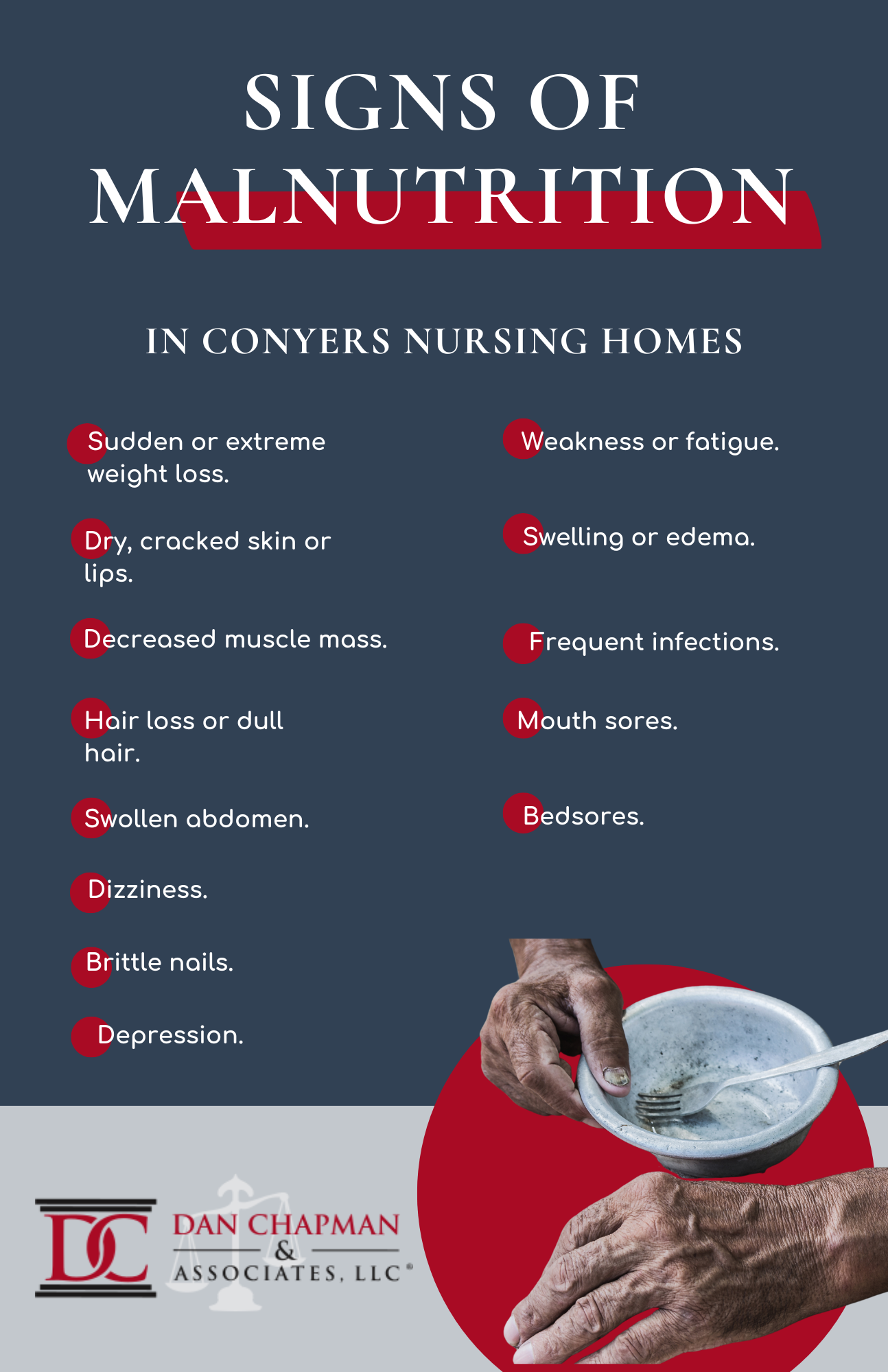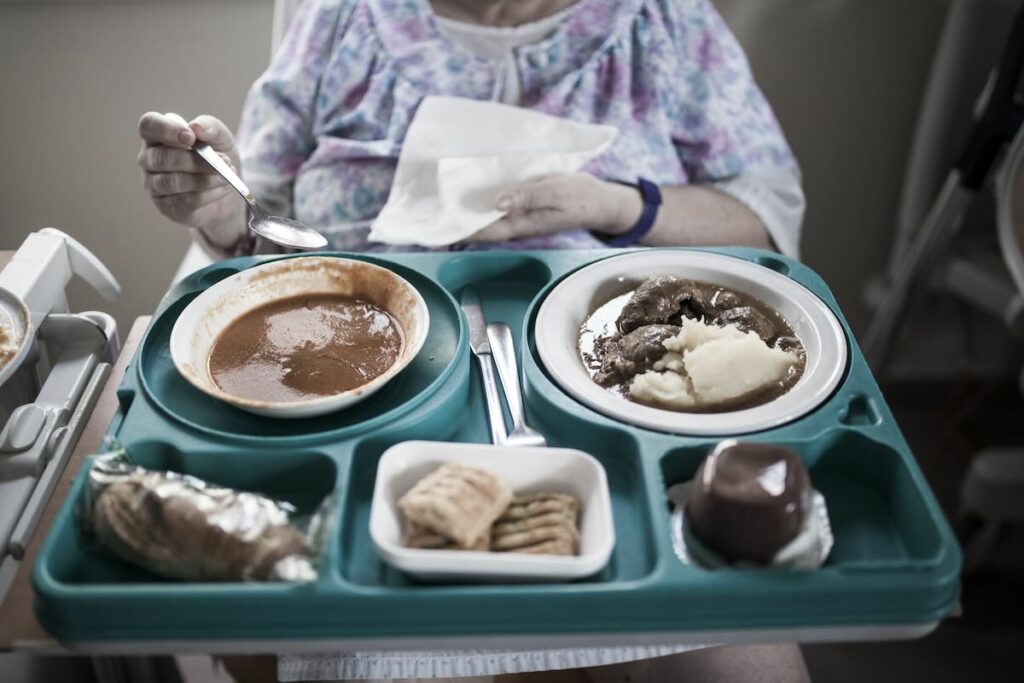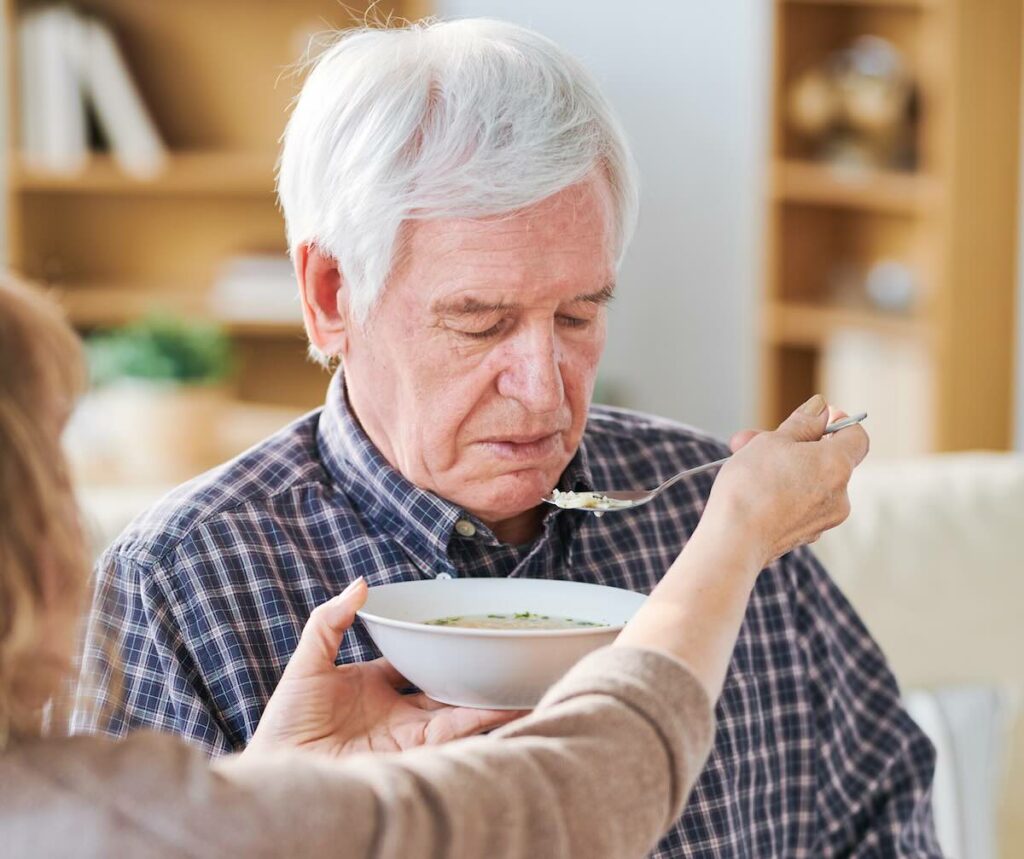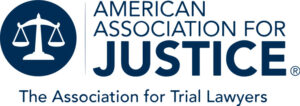Malnutrition in Conyers Nursing Homes
Georgia Nursing Home Neglect & Abuse Lawyers
Malnutrition in Conyers Nursing Homes
With aging comes inevitable changes in our bodies. These changes often increase the risk of malnutrition. Factors like activity level, diseases, certain types of medications, and energy expenditure lead to caloric requirement changes.
Malnutrition occurs when a person doesn’t get the proper nutrients needed for healthy functioning. This can mean undernutrition, where there is a deficiency of calories, proteins, or vitamins, or an imbalance of essential nutrients. For elderly individuals in nursing homes, malnutrition is particularly dangerous due to their increased vulnerability.
The Academy of Nutrition and Dietetics and American Society for Parenteral and Enteral Nutrition (ASPEN) defines malnutrition with six characteristics:
- Weight loss
- Loss of muscle mass
- Insufficient energy intake
- Loss of subcutaneous fat
- Localized or generalized fluid accumulation masks weight loss.
- Diminished functional status as measured by handgrip strength.

Why Malnutrition is Dangerous for the Elderly
Elderly people are especially susceptible to malnutrition because their bodies may not process nutrients as efficiently as they used to. Malnutrition can weaken the immune system, increase the risk of infections, lead to muscle weakness and falls, and exacerbate chronic health conditions. For nursing home residents, this can significantly decrease their quality of life and even lead to life-threatening complications.
What Causes Malnutrition in Nursing Homes?

- Inadequate Staffing: Insufficient staff can lead to inadequate monitoring of residents’ dietary needs.
- Neglect: Staff may fail to provide necessary assistance during meals.
- Medical Conditions: Certain illnesses and medications can affect appetite and nutrient absorption.
- Poor Food Quality: Meals that lack variety and nutritional value can contribute to deficiencies.
Some examples of medical issues that may cause malnutrition in Conyers nursing home residents include:
- Dementia
- Anorexia
- Liver disease
- Cancer
- Ulcerative colitis
- Irritable bowel syndrome
- Digestive problems
- Difficulty chewing/swallowing.
- Crohn’s disease
- Depression
- Alzheimer’s disease
- Difficulty absorbing nutrients.
What are the Consequences of Malnutrition?
Malnutrition can lead to severe issues, including:
- Increased risk of falls and fractures
- A weakened immune system, making infections more prevalent.
- Slower wound healing
- Cognitive decline and confusion
- Overall deterioration of health
- Kidney failure
- Rickets
- Anemia
- Memory loss
- Hair loss
- Vision loss
- Chronic heart failure
- Decreased bone mass.
- Muscle weakness
- Lethargy
Legal Duties of Nursing Homes
Nursing homes are legally obligated to provide adequate nutrition and hydration to their residents. This includes assessing each resident’s dietary needs, creating, and following appropriate meal plans; and assisting residents who need help eating. Failure to meet these obligations can constitute neglect or abuse.
Below is a list of suggested actions that help combat and reverse malnutrition. Nursing homes and other long-term care facilities should have a plan for each resident based on age, overall health, and other criteria.
- Encourage healthy eating habits by offering nutrient-dense options like peanut butter, fruits, vegetables, meats, whole grains, and dairy.
- Offer healthy snacks like smoothies, fruit, granola, cheese, or peanut butter between meals.
- Encourage daily exercise.
- Always make food accessible.
- Involve doctors and dietitians when forming individualized meal plans.
- If a resident has lost 5% of their body weight, doctors and caregivers should work together to identify and rectify the problem.
- Involve dentists when a resident has an issue with oral pain, chewing, or swallowing.
- Meals should meet individual tastes, including assorted options despite food allergies or ethnic or regional preferences.
- Some residents should always be observed while eating, especially if they are at considerable risk of choking.
- Some residents may require specific diets due to health issues, food allergies, or medication requirements. Meals should be planned around the required needs of each resident and followed meticulously.
Recognizing Signs of Malnutrition
Family members should be vigilant for signs of malnutrition, which can include:
- Sudden weight loss or gain
- Weakness and fatigue
- Dry, cracked skin or lips.
- Swelling or edema
- Decreased muscle mass.
- Frequent infections
- Bedsores
- Brittle nails
- Swollen abdomen
- Mouth sores.
- Depression
- Dizziness
- Hair loss or dull hair

Who is Most Susceptible to Malnutrition in Conyers Nursing Homes?
Some residents are more at risk of malnutrition, including those with:
- Difficulty swallowing or chewing.
- Chronic illnesses such as dementia or diabetes.
- Limited mobility, making it hard to access meals.
- Psychological issues like depression or anxiety.
How Can I Help Make Sure My Loved One is not Malnourished?
- Regular Visits: Frequent visits allow families to monitor their loved one’s condition.
- Meal Supervision: Observe mealtimes, when possible, to ensure proper nutrition.
- Communication: Maintain open communication with staff, management, doctors, and dentists about dietary concerns.
- Medical Checkups: Regular checkups can catch nutritional deficiencies early.
- Advocacy: Speak up about any care concerns.
How an Experienced Attorney Can Help
If you suspect your loved one is suffering from malnutrition due to neglect or abuse in a Conyers nursing home, an experienced Georgia nursing home abuse attorney can help.
Our team can:
- Investigate the circumstances of the neglect or abuse.
- Hold the nursing home accountable for their legal obligations.
- Seek compensation for medical expenses, pain, and suffering.
- Ensure that your loved one receives the care they need and deserve.
Contact Us
If your loved one is being mistreated, contact us today for a free consultation. We are dedicated to protecting the rights of nursing home residents and ensuring they receive the respect and care they deserve. For more information or to schedule a consultation, call us at 678-831-8875 or fill out our free case evaluation, and someone will be in touch
Request Free Consultation
"*" indicates required fields
Awards and Accolades






